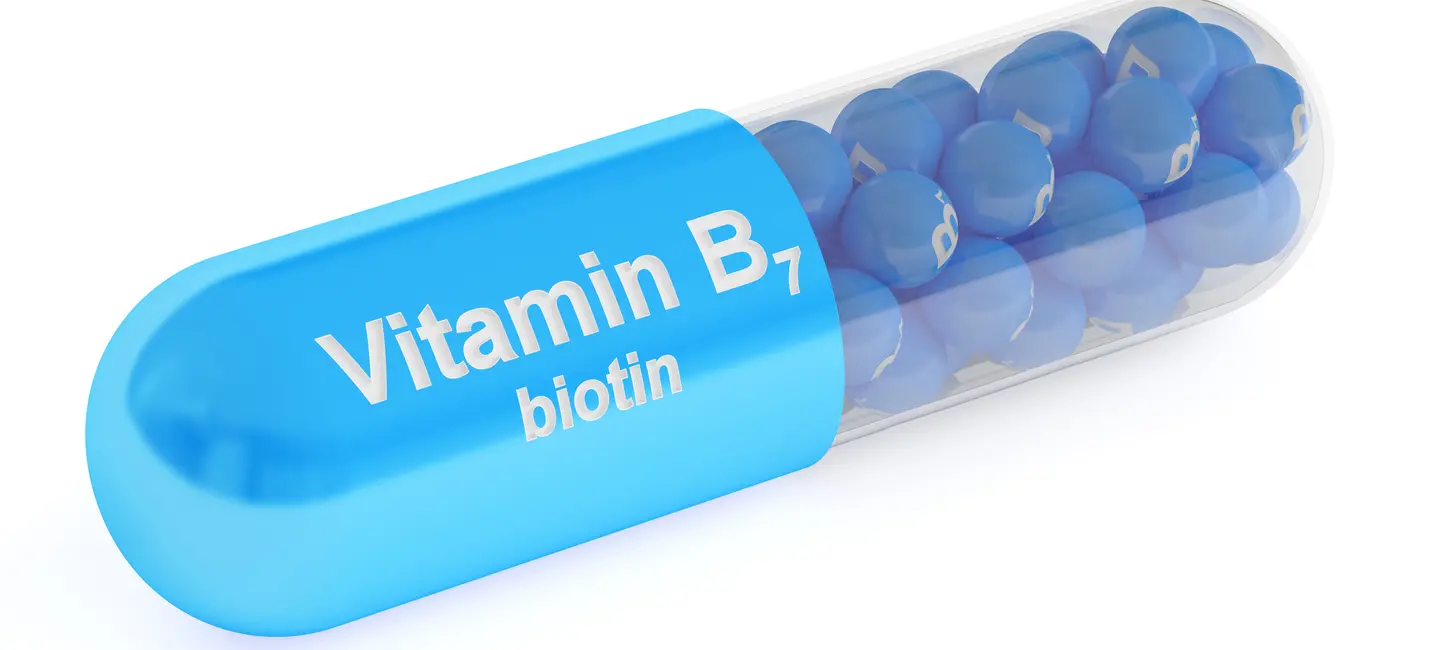
Biotin (vitamin B7) is a vitamin found in foods like eggs, milk, and bananas. Biotin deficiency can cause thinning of the hair and a rash on the face.
Biotin is an important part of enzymes in the body that break down substances like fats, carbohydrates, and others. There isn't a good test for detecting low biotin levels, so it's usually identified by its symptoms, which include thinning hair and red scaly rash around the eyes, nose, and mouth.
Biotin is used for biotin deficiency. It is also commonly used for hair loss, brittle nails, and other conditions, but there is no good scientific evidence to support these uses. Biotin supplements might interfere with some lab tests. Talk with your doctor if you are taking biotin supplements and need to have any blood tests.
Is It Effective?
NatMed Pro rates effectiveness based on scientific evidence according to the following scale: Effective, Likely Effective, Possibly Effective, Possibly Ineffective, Likely Ineffective, Ineffective, and Insufficient Evidence to Rate.
- Biotin deficiency. Taking biotin by mouth or by a shot can treat and prevent low blood levels of biotin. Up to 10 mg of biotin by mouth daily has been used to treat and prevent deficiency. A biotin shot can only be given by a healthcare provider.
- Multiple sclerosis (MS). Taking high-dose biotin by mouth does not reduce disability in people with MS. It also doesn't seem to affect the risk for relapse.
- Rough, scaly skin on the scalp and face (seborrheic dermatitis). Taking biotin does not seem to help improve rash in infants.
There is interest in using biotin for a number of other purposes, but there isn't enough reliable information to say whether it might be helpful.
Is it Safe?
When taken by mouth: Biotin is likely safe for most people when taken in doses up to 300 mg daily for up to 6 months. But it is more commonly used in lower doses of 2.5 mg daily.
When applied to the skin: Biotin is likely safe for most people when applied in cosmetic products that contain up to 0.6% biotin.
Special Precautions & Warnings:
Pregnancy and breast-feeding: Biotin is likely safe when used in recommended amounts during pregnancy and breast-feeding.
Children: Biotin is likely safe when taken by mouth. It's been used safely in doses of 5-25 mcg daily.
An inherited condition in which the body cannot process biotin (biotinidase deficiency): People with this condition might have low levels of biotin and may need a biotin supplement.
Kidney dialysis: People receiving kidney dialysis might have low levels of biotin and may need a biotin supplement.
Smoking: People who smoke might have low biotin levels and may need a biotin supplement.
Laboratory tests: Taking biotin supplements might interfere with the results of many different blood lab tests. Biotin can cause falsely high or falsely low test results. This might lead to missed or incorrect diagnoses. Tell your doctor if you are taking biotin supplements, especially if you are having lab tests done. You may need to stop taking biotin before your blood test. Most multivitamins contain low doses of biotin, which are unlikely to interfere with blood tests. But talk to your doctor to be sure.
It is not known if Biotin interacts with any medicines. Before taking Biotin, talk with your healthcare professional if you take any medications.
Alpha-lipoic acid: Taking alpha-lipoic acid and biotin together can reduce the absorption of both alpha-lipoic acid and biotin into the body.
Vitamin B5 (pantothenic acid): Taking biotin and vitamin B5 together can reduce the absorption of both biotin and vitamin B5 into the body.
Eating 2 or more uncooked egg whites daily for several months can cause biotin deficiency. Raw egg whites bind to biotin in the stomach and prevent the body from absorbing it.
Small amounts of biotin are found in foods such as eggs, milk, and bananas. It's recommended that adults consume 30 mcg daily. The same amount should be consumed during pregnancy. When breast-feeding, 35 mcg should be consumed daily. Recommended amounts for children depend on age. Speak with a healthcare provider to find out what dose might be best for a specific condition.
Biotina, Biotine, Biotine-D, Coenzyme R, D-Biotin, Vitamin B7, Vitamin H, Vitamine B7, Vitamine H, W Factor, Cis-hexahydro-2-oxo-1H-thieno[3,4-d]-imidazole-4-valeric Acid.
Information on this website is for informational use only and is not intended to replace professional medical advice, diagnosis, or treatment. While evidence-based, it is not guaranteed to be error-free and is not intended to meet any particular user’s needs or requirements or to cover all possible uses, safety concerns, interactions, outcomes, or adverse effects. Always check with your doctor or other medical professional before making healthcare decisions (including taking any medication) and do not delay or disregard seeking medical advice or treatment based on any information displayed on this website.
© TRC Healthcare 2024. All rights reserved. Use and/or distribution is permitted only pursuant to a valid license or other permission from TRC Healthcare.
